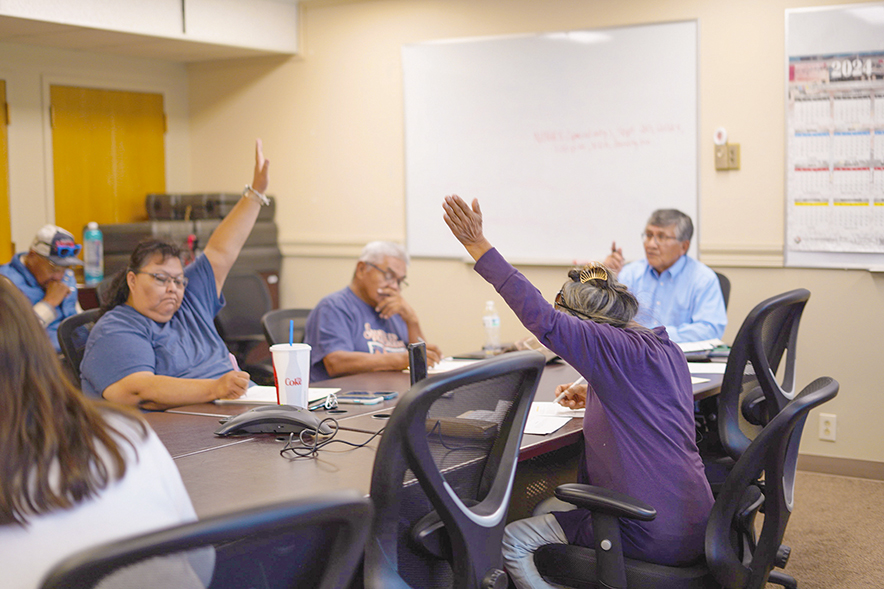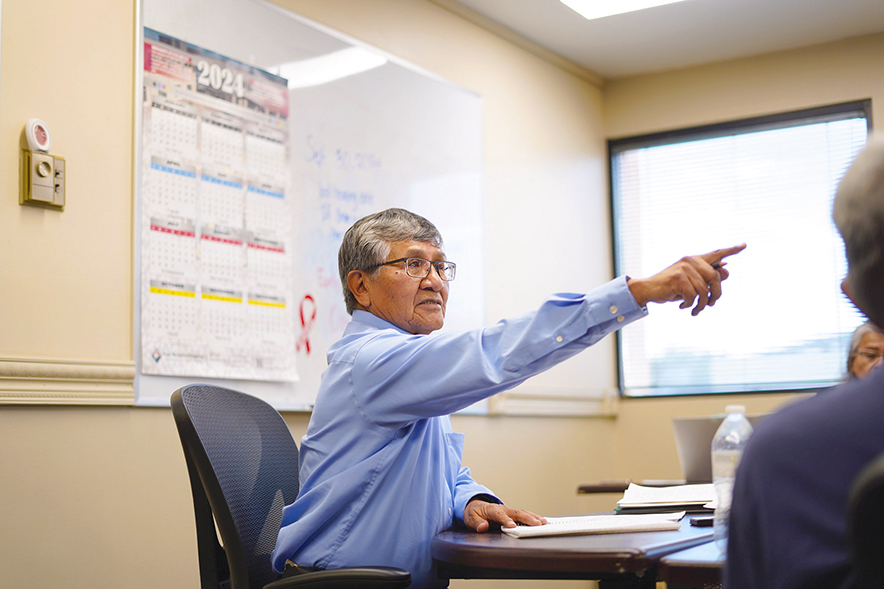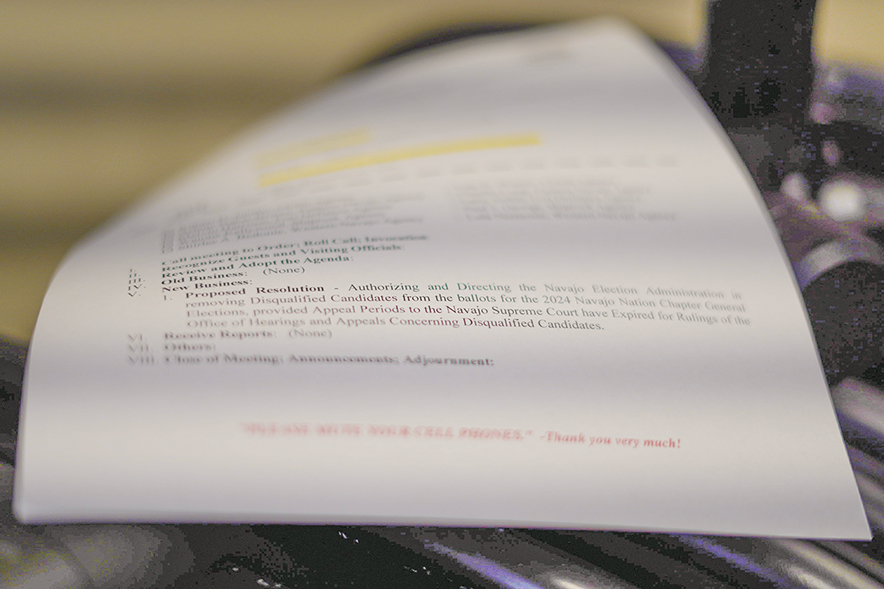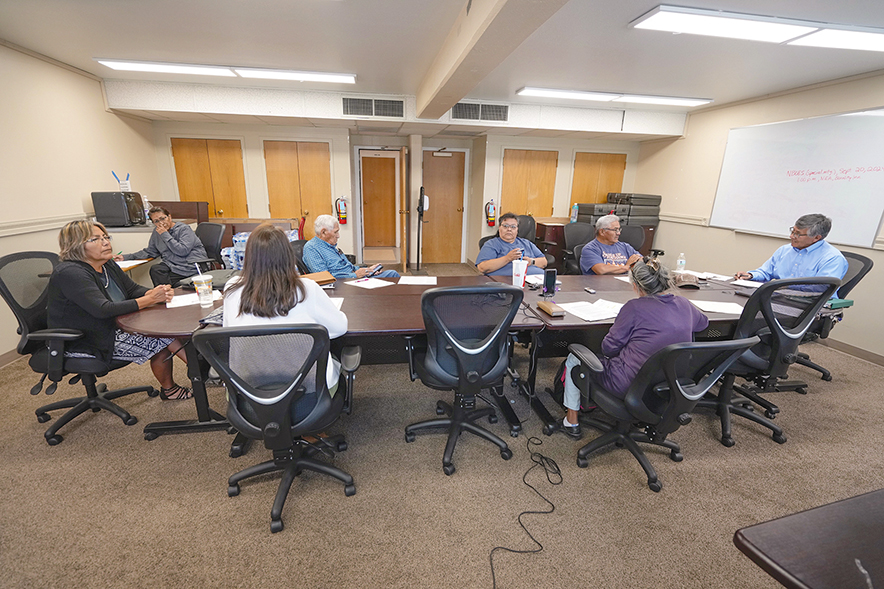
Navajo Nation disqualifies candidates ahead of chapter general election

Special to the Times | Donovan Quintero
Members of the Navajo Board of Election Supervisors vote during a meeting on Sept. 20.
By Donovan Quintero
Special to the Times
WINDOW ROCK — To ensure the timely execution of the upcoming chapter general election scheduled for Nov. 5, it has become necessary for the Navajo Board of Election Supervisors, or NBOES, to decide to remove all candidates from the 2024 chapter general election ballots.
NNOES authorized on Tuesday the Navajo Election Administration to remove all positions from the ballots that are currently subject to ongoing hearings related to the failure to file required campaign expense statements.

Special to the Times | Donovan Quintero
Navajo Board of Election Supervisors Board Chair Melvin Harrison of the Fort Defiance Agency speaks during a meeting on Sept. 20.
But that is not the only issue impacting the election administration. Its interim director, Veronica Curley, revealed several discerning issues they needed to resolve if the tribe was to have a successful election.
Curley acknowledged to the board that she had not yet had the opportunity to assess the agency’s budget in detail. Curley stated that her current understanding of the financial situation is based on rough estimates and that a continuing resolution — which was passed by the 25th Navajo Nation Council to avoid a government shutdown — is in place.
Reduced staffing, budget allocation
With the continuing resolution not yet approved by Navajo Nation President Buu Nygren, Curley expressed concerns about funding for the temporary account, which could result in a significantly reduced staffing level for the general election.
“We’re going to end up with a skeleton general election crew again,” she remarked, highlighting the potential impact on the election process.

Special to the Times | Donovan Quintero
The agenda highlighting items, including the resolution to remove disqualified candidates from the 2024 Navajo Nation Chapter General Election ballots, sits on a table on Sept. 20.
Currently, the NEA is facing a budget allocation of only $500,000 for the general election, which Curley noted is considerably lower than the funding received in the previous fiscal year.
“We were very fortunate to get additional funding last year,” she said, reflecting on the contrast between past and present financial support.
Despite efforts to manage their budget effectively, Curley revealed that not all financial transactions have been finalized. She indicated that current calculations show a balance of approximately $193,000 remaining in the NEA’s budget, further emphasizing the need for careful financial planning as the election approaches.
Additionally, Curley pointed out that some poll officials from the July 30 primary election have yet to receive their payments.
“There’s still $25,000 in that account that needs to be addressed,” she noted, indicating that outstanding payments could further strain the agency’s resources as they prepare for the upcoming general election.
Candidates disqualified
Since 192 candidates were disqualified, and with no certainty if all or some of the candidates would be reinstated by OHA, Curley said she couldn’t give the printing company, Automated Election Services, or AES, the approval to print tribal ballots.
“The printers, we’re trying to work with them, but we really can’t give them the go-ahead to print the ballots. So, I’m hoping to get a concrete decision today so I can work with the printing, with AES to start the ballot printing,” she said.
Curley explained too that it takes more than a week to proofread the ballots to ensure they’re correct before a ballot is printed.
In addition to that, she said that since the last grievance OHA hearing would be on Oct. 1, the hearing officer had 10 days to decide. That didn’t include another 10-day wait period that would be given if a disqualified candidate continued challenging their disqualification to the Navajo Nation Supreme Court.
“It’s already interfering with what’s here, the early voting. Right now, because of these hearings, we’re unable to even give the go-ahead to the printer to start printing the ballots,” said Curley.
99 candidates approved to grieve disqualifications
During a Sept. 20 special NBOES meeting, the board learned that 99 candidates were approved to grieve their disqualifications with OHA.
Candidates who were recently disqualified from running for office received official notification through a letter dated Aug. 16.

Special to the Times | Donovan Quintero
A Navajo Board of Election Supervisors meeting takes place on Sept. 20.
The letter emphasized that any candidate, regardless of whether they secured an elected position, would face a five-year disqualification for failing to submit the required campaign expense statements. It cited Title 11 of the Navajo Nation Code, reinforcing that a written notice issued by the election administration would trigger this penalty.
The disciplinary measure is part of a broader legislative initiative, known as CJA-08-24, sponsored by Navajo Nation Council Delegate Danny Simpson, which was signed into law by President Buu Nygren on Feb. 2. The legislation amends various sections of the Navajo Election Code, specifically modifying three sections, and implementing stricter penalties for non-compliance with new reporting requirements.
Richie Nez, the OHA hearing officer, noted that he has a limited window of 10 days to assess which grievances merit further investigation following a candidate’s disqualification. According to Nez, after the Election Administration notifies candidates of their disqualification, they have an opportunity to appeal within 10 days. If sufficient grounds for a hearing are established, he will proceed to schedule it; otherwise, the case may be dismissed.
Disqualifications could impact ARPA projects
Chapter officials, who did not want to be identified, facing disqualification raised concerns that repercussions of these disqualifications could extend beyond individual candidates, potentially impacting significant projects funded by American Rescue Plan Act, or ARPA, allocations.
In 2023, President Nygren allocated $8.8 million in ARPA funds to each chapter for COVID-19 mitigation efforts. Additionally, the chapter officials noted that Sihasin projects, employee funding, and firewood supplies could also face delays or interruptions, threatening years of progress in community development.
Melvin Harrison, the chairman of the Navajo Board of Election Supervisors, expressed frustrations regarding candidates’ previous non-compliance with expense report submissions. He recounted challenges over the past seven and a half years in enforcing these regulations, highlighting instances where candidates avoided or ignored requests for filing their reports. Harrison stressed that election laws are straightforward and that candidates are made aware of their responsibilities when declaring their candidacy, emphasizing the need for accountability within the electoral process.
The new law requires all candidates to submit their campaign expense reports within 10 days following any Navajo Nation election, including primary elections. Failure to comply with this requirement results in automatic disqualification from running for office for five years.
According to interim director Curley, the NEA has been focusing on the outcomes from OHA.
“Right now, based on these hearings, it kind of left us in an uncertainty with our timeline with the upcoming election,” she reported to NBOES. “The last hearing is scheduled until September thirtieth, and that impacts the timeline. And the hearing office has ten days to issue their decision. Provided that OHA issues their decision on September thirtieth, then the Supreme Court appeal falls in on October tenth.”
Carry-over funds not used
Council Delegate Otto Tso, a Resources and Development Committee member, who attended the meeting was asked if the election administration could carry over whatever remaining funds it had so that it could have adequate funding for the upcoming election.
He explained that because of past carry-over funds not being used, he told the election board that in the 24th Navajo Nation Council, Delegate Carl Slater did away with carry-over funds.
“The only way to allow a carry-over, it takes seven-eighths of the Council to override it,” Tso said, adding that the law enacted in the 24th Navajo Nation Council required 23 of the 24 delegates to override the law. “It can happen if a comprehensive budget is approved. I think if the election board asks the Council, I think that is doable. You just need that amendment on the floor.”
Manuel Rico, Speaker Curley’s chief of staff, responded to a question posed by NNOES chair Harrison if a continuing resolution requires President Nygren’s signature before money can be spent, as well as if expenditures could continue as it has been.
“Is that how this works?” Harrison asked.
Rico explained that the Council asked the Office of Money Management if they could submit a budget.
“OMB said, ‘No,’ so we just continue until a comprehensive (budget) is created. Once we start working on the comprehensive that’s when start putting the budget together. To simply answer your questions, no carry-overs are happening,” said Rico.
He added election administration’s fixed costs might be $100,000, but he needed to double-check the amount.
“I’m glad you said that because we need the fixed costs for the election. Two weeks elections start, so we need the fixed costs to pay the poll officials. I don’t know how we’re gonna meet the whole amount of the expenditure,” Harrison said as he explained that it takes half a million dollars to pay for chapter elections. “So, if we’re only given five hundred thousand for the election, it’s going to be challenging.”
Interim director Curley asked Rico if the remaining $193,000 budget, the election administration has left in the current fiscal year budget, would expire at the end of September.
“Yes, that’s correct,” responded Rico.
Curley added that she would not be able to pay poll officials since the continuing resolution, had not yet been approved by President Nygren because the funds that would be used to pay them were in the unmet budget needs.
“So, there’s gonna be poll officials (that) won’t be paid right out, unless we switch it around,” she said.
Emergency legislation for budget
Delegate Tso responded to Curley’s and Harrison’s concerns and recommended they put a budget together and let the $193,000 go back into the system. The Council can convene then to create emergency legislation that could include the $193,000 remaining budget in an Unreserved, Undesignated Funds, or UUFB, request.
“Then you get it back in the UUFB to pay for the election. That’s another route,” said Tso.
NBOES member Paul J. George, representing the Shiprock Agency, asked Curley how much costs were to pay poll officials.
After a few minutes of calculating what they pay a chief poll judge, poll judge, and poll clerk, working on Election Day and training, and mileage, George was answered: an estimated $160,000 total was usually paid out to poll officials.
“The other biggest cost is the printing of ballots. Éédígiidó, that’s the other the biggest cost. Ee’biniinaa, we need to do a UUFB right away because of the continuing resolution.”
Former NBOES member Jackie Burbank, from Blue Gap Chapter, who attended the meeting, told NBOES that whatever they decide, they needed to “stick with the law.”
“Ą́ąndiiʼghéédééh, hxą́ʼndį́į́ ádáánį́į́ndi,” he said.
Before Delegate Tso and Rico left, Harrison informed them additional funding would also be needed for the inauguration and cancellation of registration, also known as purging.
“So, you don’t get caught off guard, so it doesn’t surprise you,” he told Tso and Rico.
The Navajo Board of Election Supervisors is made up of 10 Navajo people elected to represent the five Navajo Nation agencies. It solely analyzes and makes recommendations to the Navajo Nation Council, which oversees the election supervisors, to change tribal election laws that are sometimes considered controversial.
Members of NBOES are Robert D. Jumbo and Leta D. Honnie, Chinle Agency; Arlene Nakai-Brown and Charles Long, Eastern Navajo Agency; Melvin Harrison and Larry Noble, Fort Defiance Agency; Watona Kellywood and Paul J. George, Shiprock Agency; Shirlee A. Bedonie and Lula Neztsosie, Western Navajo Agency.
Unless the election administration changes it, the last day for voter registration is today, Sept. 26. General election is on Nov. 5.







 Highway 264,
Highway 264, I-40, WB @ Winslow
I-40, WB @ Winslow